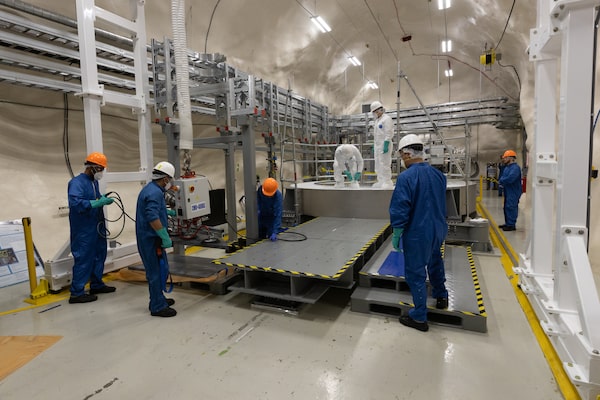
Workers at SNOLAB install a dark matter detector in the underground facility in the summer of 2023.Patrick Dell/The Globe and Mail
Roseann O’Reilly Runte is president and chief executive officer at The Canada Foundation for Innovation. She is the author of Canadians Who Innovate: The Trailblazers and Ideas that Are Changing the World, to be published May 7.
Natural resources have been key to Canada’s survival and growth. Our oceans, forests, agricultural lands, mineral and energy resources support us.
It is no wonder that resource companies dominate Canada’s economy. Our people have always fished and farmed, harvested timber and extracted the wealth that lies beneath our feet.
Today this is no longer sufficient. Concerns surrounding sustainability have emerged after decades of persistent resource extraction. Global conflict, a pandemic, economic downturns and environmental disasters have brought about an unprecedented era of rolling polycrises.
To survive and grow, Canada must remember what our focus on resource extraction has sidelined: the idea that our best asset is our people. We will need to rely not only on existing intelligence and strength, but on acquiring new knowledge and skills, problem-solving capacities and the ability to be innovative.
Here are some examples of Canada’s talent and innovation, and the directions in which we need to go.
When Dr. Heather Jamieson discovered that arsenic was seeping out of mines in our North, poisoning plants, wildlife and people 30 kilometres from the sites, she opened the door to developing strategies to reverse the damage done but to adopt mitigation processes in future developments.
When Dr. Stephen Kokelj describes the effects of melting permafrost across our North, he reminds us of the fragility of our habitat. If we build on permafrost and forest fires hasten its degradation, we will lose entire ecosystems.
Researchers at the Universities of Guelph, Manitoba, Alberta and Saskatchewan and others are working with industry leaders in agritech. Together they have founded 2,500 innovative companies, and achieved in a few short years, a return on investment of 200 to one. Their research focuses on an increasingly important issue: With population growth in this changing world, we need to increase agricultural yields while using less fertilizer, no pesticides, and being prepared to deal with drought and more extreme fluctuations in temperature.
Meanwhile, Dr. Matthew Miller has come up with a nasal spray delivering vaccines. Dr. Leyla Soleymani invented anti-microbial coatings for surfaces, and VIDO, a laboratory in Saskatoon, offers a world-leading example of work to prevent viruses from moving from one species to another. These are innovations born out of the COVID-19 pandemic and demonstrate our ingenuity and agility.
To be able to double down on our research, and continue to come up with groundbreaking innovation, we must focus more on our people. And we must not forget those who have lost their livelihoods or those, like immigrants, who are establishing them. We must offer them access to education and training, brilliant teachers, exceptional mentors and equipment and facilities.
Look what happens when talent is given opportunity to flourish:
Christina Gold had arrived in Canada at the age of five, could not speak a word of English and found school difficult. Today, when only 3 per cent of the world’s top 500 companies were led by women, she has presided over seven major corporations.
Priti Wanjara had arrived in Montreal from Mumbai and struggled as she spoke neither English nor French. Today, a highly successful engineer, she tries to pay it forward, teaching students pro bono at Concordia and the Royal Military College of Canada.
We must also keep in mind that the sum of our talents is always greater than its parts.
When we are facing many complex global issues, we cannot afford to be isolationist. We need to collaborate regionally and nationally. We must remember the greatness we can accomplish both in Canada and internationally when we work together.
Look at the Perimeter Institute and the University of Waterloo, now home to some of the best experts in quantum technologies and applications in the world.
Or Sudbury. Nickel is still a precious resource, and the collaboration deep down in Vale’s mine with our Nobel physics laureate Art McDonald and his colleagues offers not only employment today but a place for Canada in the history of the world tomorrow.
People are our greatest resource. Recognizing and supporting their potential offers hope for a better future.